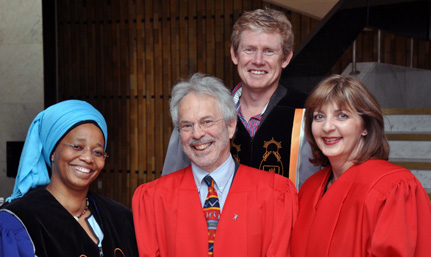Latest News Archive
Please select Category, Year, and then Month to display items
11 September 2024
|
Story Anthony Mthembu
|
Photo Anthony Mthembu and Chelsea Carolus
 From the left: Geraldine Lengau, Senior Officer in the Unit for Institutional Change at the UFS; and Oratile Reina, West College Prime.
From the left: Geraldine Lengau, Senior Officer in the Unit for Institutional Change at the UFS; and Oratile Reina, West College Prime.
As part of the initiatives lined up for College Week, the student leaders of West College at the University of the Free State (UFS) hosted a dialogue that primarily focused on discussing social justice as a value of Vision 130. The dialogue was held at Outeniqua Residence on 3 September 2024 and was well attended by students within West College.
According to Oratile Reina, West College Prime, “the motivation for the dialogue was to prepare newly elected leaders and our college community to align their efforts with Vision 130 – a vision that aims to create a more inclusive, equitable, and socially just environment on campus”. As such, she highlights that the dialogue was an opportunity for leaders to discuss practical strategies for implementing these values in their respective spaces, and to encourage those in West College to become better citizens inside and outside the university.
A conversation on social justice
The dialogue was facilitated by Geraldine Lengau, Senior Officer in the Unit for Institutional Change and Social Justice at the UFS. Lengau touched on several aspects pertaining to the topic of discussion. Firstly, she allowed the audience to give their definition of social justice, especially as students within the institution. In addition, she went on to talk to the audience about sexual assault in the context of social justice. In this instance, Lengau gauged whether the students knew which processes to follow in the event of a sexual assault incident, and whether they were acquainted with the UFS Sexual Harassment, Sexual Misconduct, and Sexual Violence Policy. Furthermore, the audience was given the opportunity to outline what social justice looks like to them in the spaces they occupy, including in their respective faculties, the sports they play, and the leadership structures they form part of. “I was encouraged to see that students take their right to a socially just university in very high regard, and that they were willing to break it down from what Vision 130 proposes, in order to align it with their common understanding,” said Lengau.
As the dialogue concluded, the audience signed a pledge committing to uphold the values of Vision 130. According to Reina, “The pledge represents a promise to take concrete steps towards fostering an inclusive and equitable campus culture. By signing the pledge, the leaders are not only agreeing to embody these principles in their leadership roles but are also holding themselves accountable to their peers and the broader university community.”
UFS Celebrates Africa Day
2013-05-24
|
 |
|
At the Africa Day Memorial lecture was, in front from left: Dr Choice Makhetha, Vice-Rector: External Relations; Prof Henning Melber and Prof Heidi Hudson, Head of the Centre for Africa Studies. At the back is Prof Lucius Botes, Dean of the Faculty of the Humanities.
Photo: Stephen Collett
24 May 2013 |
Prof Henning Melber: Lecture (pdf)
The University celebrated the 50th anniversary of Africa Day by hosting the annual Africa Day Memorial lecture. Hosted by the Centre for Africa Studies (CAS), celebrations included a day-long colloquium which looked at the continent from various disciplines.
Delivering the Africa Day and also his inaugural lecture, Prof Henning Melber, Extraordinary Professor at CAS, spoke about the mystifying power of ideology and identity with regard to Africa and Africa (n) studies.
Before his lecture, senior professors from different faculties took part in a colloquium, delivering papers on a variety of topics relevant to the continent. In a session on historical-political legacies, Prof Hussein Solomon, Senior Professor in the Department of Political Science, spoke about Critical Terrorism Studies and its implications for Africa. He was joined by Prof Jo van As, Head of the Department of Zoology and Entomology, who spoke about the legacy of colonialism on the conservation of Africa’s river systems. Others topics which were addressed, included the development of sign language, cardiac medicine and science and mathematics education in Africa.